
VOL. I NO. 12 DELHI, THURSDAY DECEMBER 3, 1942.
CANTON, RANGOON, BLAIR
FUNDS STILL TRICKLE THROUGH We are going to press right in the midst of the S.O.S. headquarters collection for the C.B.I. Roundup's fund for the Bengal cyclone sufferers, so our returns are necessarily incomplete this week. The total amount paid in at 3:30 p.m. Tuesday stands at Rs. 1,773. This represents some 500 chips over the 1,258 rupees reported last week, and with the exception of small contributions mailed directly in by big-hearted G.I.'s in the field, it is all from New Delhi units. Headquarters squadron A.A.F. took its collection on payday, donating 205 rupees for the cyclone sufferers on an even-stephen split of the hat with the Chaplain's Christmas fund. Branch headquarters officers tossed in another 60 chips and most of the balance represents the partial collection of S.O.S. headquarters. Collections from troops and units outside New Delhi should be in hand through the coming week. The desire of troops in the field to aid the sufferers is shown by the receipt of several letters from enlisted men sent direct to the C.B.I. Roundup enclosing dog-eared Rupees. One from T/5 Maurice M. Lehman, enclosing 10 chips, says "I happened to be in that port when the storm hit and got a taste of it myself. I know it's no joke." Lehman is not the only American soldier who has seen the devastation at first hand. We have a report on practical help given by our troops in the area from K. S. Patton, the American Consul-General, who writes: "It is learned from a staff reporter of the Amrita Bazar Patrika that he has received from several Indian sources very approving comment on the conduct and helpfulness of American soldiers stationed in the cyclone relief districts of Bengal. "This reporter says that American soldiers have been very generous with their rations, sharing them from day to day with the distressed local people. They have also assisted villagers and farmers in salvage efforts and other activities. Their local prestige and popularity already good, is now said to be very good." |
Thanksgiving Celebrated
By Bombing Raids
CBI Bomber ranged far and wide last week and part of this to attack enemy installations in China, Thailand and Burma in what was undoubtedly the heaviest offensive period of the war from this theater.
India Air Task Force struck a Jap-controlled refinery in Bangkok, Thailand, raided Rangoon twice at night and attacked Port Blair in the Andaman islands. Heavy damage was reported on each raid and one American bomber is still unreported.
In China, meanwhile, the China Air Task Force made five forays into enemy territory using dive-bombing and strafing tactics in addition to high level bombings.
Official communiqu s follow:
Chungking - Bomber and fighter pilots of the U.S.A. Air Force, striking hard from
|
Direct hits were scored on ammunition dumps and adjacent buildings at Lungling. In the Haiphong shipping base docks and warehouses were heavily hit and fired and smoke were observed 80 miles from the target. A 12,000-ton transport was sunk, one 5,000-ton auxiliary vessel was seriously damaged and several smaller vessels badly strafed.
The Sanchau Islands air installations, south of Canton, were bombed, scoring hits on runways, barracks and shops. One plane was destroyed during an attempted take-off. A large hangar housing reserve enemy aircraft for the Canton-Hong Kong area was believed demolished.
Hitting again in the Canton district a strong force of B-25's and P-40's struck the Tien Ho airdrome in one of the most successful missions of the CATF. Two hangars were hit directly and several adjacent hangars possibly leveled. The headquarters, officers' barracks, and runways were damaged by direct hits. Oil storage tanks were set afire, seven to 10 planes were destroyed on the ground and one enemy bomber crashed attempting take-off.
One interception was attempted by the enemy but no contact was made. Anti-aircraft fire was ineffective.
All our planes returned safely from all missions.
In a retaliatory night raid by the enemy near Kweilin three P-40's intercepted an unknown number of enemy aircraft, destroying one bomber, one Zero and scoring hits on another bomber.
One P-40 was lost but the pilot reported safe.
New Delhi - Heavy bombardment squadrons of the 10th U.S. Air Force attacked Japanese installation twice November30. Docks and warehouses at Rangoon were heavily bombed in a night attack. Five direct hits on docks were reported with other hits in the warehouse area.
In a daylight raid off Port Blair in the Andaman Islands, American heavy bombers made a direct hit on a 250-foot naval auxiliary vessel. From these operations one of our bombers is unreported.
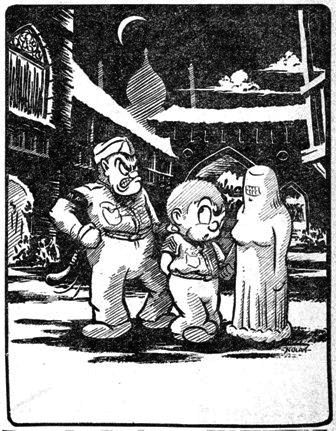
|
By M/SGT. L. R. McNEVEN
All personnel in this theater are now busily engaged in computing how much time they still have to remain since the news of the 12 and 18 months bill leaked out . . . This unit was fortunate in the assignment of two fighter pilots with previous combat experience - Capt. Mahoney and Lt. Hynds.
Capt. Mahoney has seen action in the Philippines and Australia and has several confirmed enemy planes to his credit. Lt. Hynds sort of had to fight his way up here - he was able to shoot down two enemy aircraft enroute . . .
Upon receipt of instructions governing the award of the D.F.C. and the Air Medal it was found that 15 pilots of this command are eligible for one or both awards . . . All personnel are eagerly awaiting the return of Chaplain Tull as it has been rumored a Service Club is to be opened soon after his arrival. Several men have been appointed from the various organizations to assist the Chaplain work out the details. The opening of such a club will fill a vacant spot in this area and it is felt that it will in some way take the place of the beer and coca cola we read about . . .
A boost in the morale of every individual was received recently when the commanding officer received a reply to a letter of condolence he had sent to the courageous father of a pilot who had lost his life here. In part the message read "Although I have lost my only child, I am sure that he has not died in vain." Messages such as this depicting the spirit of all can only inspire and hasten the defeat of the enemy here.
Each and every one is around at mail call to sweat out Santa since we have been tipped off to his coming by several Xmas cards and letters . . . We have been informed that the Home Guards are really having a tough time: gas rationing, tires wearing out, have to be in by 12 every night, only one 24-hour pass a week, only one 3-day pass a month - sure is tough on them, eh fellas?
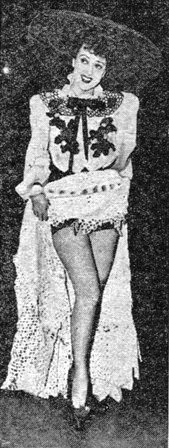 Here's a picture of Gypsy Rose Lee at last. Looks like a clothes horse, doesn't she? America's premier
strip-teaser is now writing a musical comedy about a strip-teaser who turned authoress.
Here's a picture of Gypsy Rose Lee at last. Looks like a clothes horse, doesn't she? America's premier
strip-teaser is now writing a musical comedy about a strip-teaser who turned authoress.
|
NEW ALLIED OFFENSIVES IN CHINA AND BURMA
"The recent attacks on Japanese positions on both sides of the Chinese-Burma border by the USAAF in China, which have been followed by heavy air attacks from India on Rangoon and Toungoo, may be construed as recognition of a new Japanese threat in Southwest China," the New York Herald Tribune declares in an editorial recently.
The editorial continues:
"A Chinese military spokesman recently estimated that there were 30,000 men in the Burma theater . . . These numbers have been increased by many who have been moved up to former Chinese bases in Yunnan.
"In neither size nor direction do these movements yet suggest a plan to invade India . . . In Chungking, it is believed that it is the reinforced Japanese Army's purpose to make a determined effort to occupy the Yunnan Province during the present dry season and this begins to look very probable indeed.
"The United Nations cannot afford to let China be cut off . . . This is fully appreciated in London, Washington and Delhi, of course, and the Anglo-American raids on Burma are presumably just tokens of what will be done about it. Let no one doubt that it is worth doing thoroughly, for a Japanese failure would be good there, before communications with India are reopened through the Mediterranean, would have as depressing an effect on Tokyo as the Japanese occupation of the Kunming airport would have on Chungking."
CAMOUFLAGED XMAS CARDS
By T/5 OTTO TOLONES
There may be a rubber shortage and there may be a gasoline shortage but the problem of Greeting Cards has been solved. The mail must go through.
It has been discovered that an unlimited quantity of obsolete dinner invitations could be obtained from civilian sources at a reasonable figure.
Now the McMillans and the Slocums as well as the rest of the families back in the States will not feel that they have been neglected. The boys are sending these camouflaged Greeting Cards home to friends and relatives for Christmas and New Years.
These dinner invites are completely inscribed with the Chinese language of which the contents the senders themselves are unaware. A few of the cards have been translated and short verses of various sentiment seem to be the custom of the Chinese dinner invitation.
The boys all seem to have intentions of explaining to their friends and relatives at a later date. Just send them a Roundup fella.
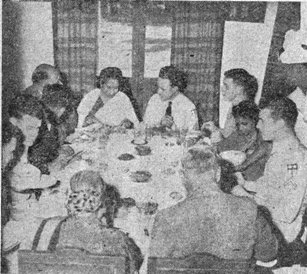 THANKSGIVING DINNER - Although work went on as usual in New Delhi Thanksgiving Day some soldiers were lucky
enough to get to Indian and British homes for their traditional dinners. Above is a dinner given by Mrs. Myra
Natarajan and her father and mother. Mr. And Mrs. S. W. Bobb (back to camera) for five soldiers. Mrs. Natarajan
is at the far end of the table.
THANKSGIVING DINNER - Although work went on as usual in New Delhi Thanksgiving Day some soldiers were lucky
enough to get to Indian and British homes for their traditional dinners. Above is a dinner given by Mrs. Myra
Natarajan and her father and mother. Mr. And Mrs. S. W. Bobb (back to camera) for five soldiers. Mrs. Natarajan
is at the far end of the table.
|
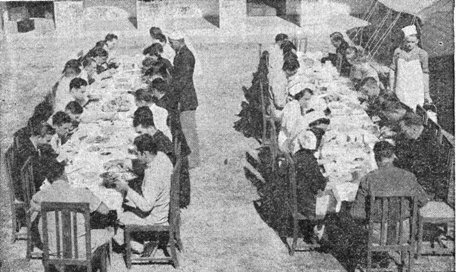 BILL ROLLER'S CHOW - The hospital gang came through with a royal feed for all the patients in the patio of
the hospital. Nurses, doctors, orderlies and the sick had the best dinner of the year.
BILL ROLLER'S CHOW - The hospital gang came through with a royal feed for all the patients in the patio of
the hospital. Nurses, doctors, orderlies and the sick had the best dinner of the year.
|
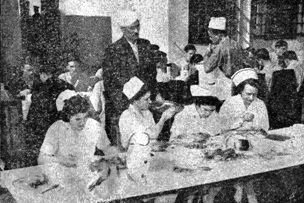 CHOW HOUNDS - It was rumored that the biggest chow hounds, without regard to figures, were the nurses. Scraping
the crockery are Lts. Ellen Marbet, Margaret Greulich, Marian Coggeshall and Anne Miser.
CHOW HOUNDS - It was rumored that the biggest chow hounds, without regard to figures, were the nurses. Scraping
the crockery are Lts. Ellen Marbet, Margaret Greulich, Marian Coggeshall and Anne Miser.
|
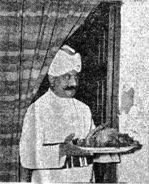 THE MAHARAJA - This is "The Maharaja" who's bringing out the goose at the Natarajans. Pipe the gleam in his
eyes!
THE MAHARAJA - This is "The Maharaja" who's bringing out the goose at the Natarajans. Pipe the gleam in his
eyes!
|
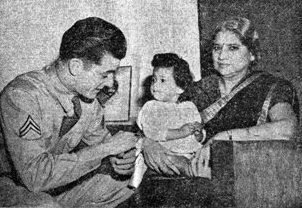 GOLD-DIGGER - At the Natarajan party little Bunty got every American soldier's ring in the place even though
her grandmother, Mrs. Bobb, obviously disapproved. About to hand over the jewelry is Corp. Stanley Kogut.
GOLD-DIGGER - At the Natarajan party little Bunty got every American soldier's ring in the place even though
her grandmother, Mrs. Bobb, obviously disapproved. About to hand over the jewelry is Corp. Stanley Kogut.
|
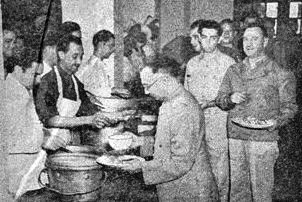 SQUADRON MESS - The headquarters squadron mess was visited by Shiva Rao, Indian newspaperman, who is shown with
that heaping plate of calories. The guy looking for the birdie is Maj. Raymond W. Wiseheart, CO of the headquarters
squadron, and the fellow with the stripes is M/Sgt. Harold Elliot, squadron mess sergeant.
SQUADRON MESS - The headquarters squadron mess was visited by Shiva Rao, Indian newspaperman, who is shown with
that heaping plate of calories. The guy looking for the birdie is Maj. Raymond W. Wiseheart, CO of the headquarters
squadron, and the fellow with the stripes is M/Sgt. Harold Elliot, squadron mess sergeant.
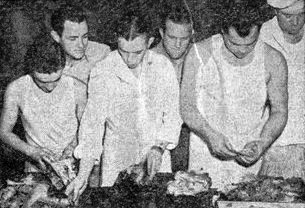 KP CHASERS - The gents who got up the headquarters dinner are , left to right (including the two guys in OD
who just got lost) Corp. James W. Graham, Pfc. Andrew T. Scott, Pfc. Leonard C. South, Pfc. J. P. Gould, Corp.
H. L. Warren and Pfc. J. C. Bentley. Pfc. Merrill Stacker got cut out by the
photographer who lives in the
Marina Hotel and isn't hard to find.
KP CHASERS - The gents who got up the headquarters dinner are , left to right (including the two guys in OD
who just got lost) Corp. James W. Graham, Pfc. Andrew T. Scott, Pfc. Leonard C. South, Pfc. J. P. Gould, Corp.
H. L. Warren and Pfc. J. C. Bentley. Pfc. Merrill Stacker got cut out by the
photographer who lives in the
Marina Hotel and isn't hard to find.
|
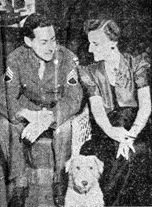 CLARK GABLE? - Another party was given American soldiers by James Kewley Cowley. The sergeant who looks like
Gable, less the ears, is Bob Morrell, while the lady is Mrs. Rene Perry-Keene. The guy with the whiskers
wouldn't give his name, but he left his impression on the calves of several party participants.
CLARK GABLE? - Another party was given American soldiers by James Kewley Cowley. The sergeant who looks like
Gable, less the ears, is Bob Morrell, while the lady is Mrs. Rene Perry-Keene. The guy with the whiskers
wouldn't give his name, but he left his impression on the calves of several party participants.
|
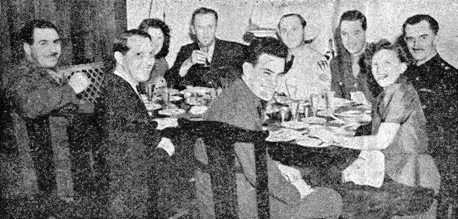 COWLEY FANTASY - This is the Cowley party. Left to right are Capt. James Halley, Cowley, Mrs. Cowley,
Sq. Ldr. Mervyn Bay, T/3 Jack Nolan, Corp. Henry Unger, Morrell, Mrs. Perry-Keene and Maj. Evan Boyd-Morrison
is the pucca gentleman with the peculiar leer. He did some remarkable things during the course of the evening.
COWLEY FANTASY - This is the Cowley party. Left to right are Capt. James Halley, Cowley, Mrs. Cowley,
Sq. Ldr. Mervyn Bay, T/3 Jack Nolan, Corp. Henry Unger, Morrell, Mrs. Perry-Keene and Maj. Evan Boyd-Morrison
is the pucca gentleman with the peculiar leer. He did some remarkable things during the course of the evening.
|
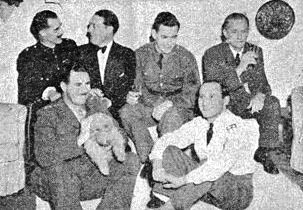 SIX NATIONALITIES - Six nationalities are represented here. Boyd-Morrison is Irish, Cowley is Manx, Nolan is from
Brooklyn Bay, Australia, Halley is British while Unger, although a soldier in the United States Army, is a
refugee from Vienna. Photos by S/Sgt. William F. Cox.
SIX NATIONALITIES - Six nationalities are represented here. Boyd-Morrison is Irish, Cowley is Manx, Nolan is from
Brooklyn Bay, Australia, Halley is British while Unger, although a soldier in the United States Army, is a
refugee from Vienna. Photos by S/Sgt. William F. Cox.
|
SHER SINGS TO CHINESE
By LT. MORTON SHER
(Lt. Morton Sher is a fighter pilot in General Chennault's fighter command, operating under Colonel R. L. Scott, somewhere in China. This is his story of his first combat mission.-Ed.)
"Raid on Hong Kong." Little did I realize the events that were to follow this order given by our commanding officer. And if I had known I am quite sure I would have followed the same course, for I actually gained more from this mission than it cost me considering the invaluable experience it provided.
We took off from our base early one morning in October in a flight of P-40's and flew to our assembling point. There we contacted the bombers that we were supposed to escort to our target. More P-40's also joined us from another Squadron. After gasing and preparatory instructions we took off. The pursuit grouped around the bombers in a protective veil. The weather was perfect for our work. Our only danger area was out of the sun and that was behind us and to our right, which was friendly territory.
NO TROUBLE
We reached Hong Kong without the slightest trace of trouble. The bombers released their destructive and death-dealing cargo and headed home. The flight to this point had run so smoothly and peacefully that it seemed a simple task to bomb a Jap base in China - Then it happened.
Major "Tex" Hill, on whose wing I was flying, sighted a large number of Jap Zero fighters climbing on our right and below us, heading straight for our bombers. He immediately gave the attack signal and peeled off in a steep dive after the lead ship. I followed him and picked the second Zero for my target. I saw the ship that "Tex" was firing on blow up, and then I let the one I was after have a strong dose of steel.
My shots went into the canopy and through the pilot. His ship fell off in a spin and crashed in the bay. The ships that were following these two up attacked me and I still wonder how they missed. At least five took shots at my ship on their way by and one nearly crashed into me. When I regained control and looked around the sky seemed full of turning, twisting and diving shops. It was hard to decide which course to take.
ALL ALIKE
Friend and foe seemed alike until you approached one and he started firing at you. At this point I saw one of our bomber's left engine smoking seemingly in danger of failing. I immediately flew over to it's area to investigate. As I neared the ship I saw four Zero fighters attacking the bomber. I fired at them and three turned on me, so I turned away and began diving with the three Jap ships right behind my ship.
I dived down to the surface of the water and skimmed along on a course that would carry me back to my own field. After skimming along for some time my engine began running very rough so I decreased manifold pressure and began to climb up in order to estimate my position. After climbing for approximately five minutes I glanced behind my ship and saw two Zeros diving straight for me. The only thing to do was to nose down and dive away.
My engine was running so rough that I thought it would jump right out of the ship at any moment. From then on it was a running fight for me. It seemed the Japs were vowed not to let me get home safe. Every time I would slow down to save my engine they would catch up to with me and I would be forced to dive away again. My gas supply was running low and the engine seemed destined to quit at any time.
SAW FIELD
I flew over a river and followed it in the hopes of running across a field in which I could land. I was just getting ready to bail out when I saw a small field ahead, right by the river bank. I made for this field and circled it to ascertain whether or not I could safely land on it. My ship was losing altitude and the field looked pretty good so I decided to attempt a landing.
I made my approach and got my wheels and flaps down. I hit three points right on the near end of the field and was rolling along fine when the right wheel fell in a hole about three feet deep. The ship nosed over on its back and I was knocked out by the force of the impact. I came to, hanging upside down in the cockpit, wondering whether or not I had been dreaming.
I unfastened the safety belt and looked out of the glass to see where I was. There were a bunch of people standing around looking at the ship, but I couldn't tell whether they were Chinese or Japanese. I decided to take a chance and proceeded to get out of the airplane. The canopy was crushed and wouldn't open, so I took my 45 automatic and knocked a hole large enough to crawl through and went out with my gun in my hand.
FIGHTING FOR CHINA
No one seemed to bother me so I figured they were friendly and showed them my Chinese flag which told them I was an American ally fighting for China. They covered my ship with grass and took me to a ditch in which I could hide. About five minutes later the two Jap Zero's that had been following me came over the field looking for my ship. The camouflage was so effective that the Japs overlooked the ship and kept on with their search.
The Chinese then took me to their town in which I was the first white man ever to set foot. The curiosity that my presence in this town aroused has probably never been equaled. The news of my arrival soon spread throughout the countryside and the natives started journeying in to get a look at the American flyer fighting for China. My new found friends took me to the Government House where the mayor and all the town officials lived. Here I was given a room furnished in a pleasing Chinese manner.
My pleasure was short-lived, however, when I examined the bed. It was then I made the unpleasant discovery that the Chinese, that is the interior people untouched by the coming of the white man, sleep on wooden beds covered with a sheet of cloth. I was so tired that I didn't notice the hardness the first night, but woke up with the feeling that I had been through a tough football game.
CURIOUS CHINESE
When I opened my eyes and looked around I saw a line of curious Chinese staring at me in bewildered wonderment. From this time on I was constantly under the gaze of these people who had never seen a white man, but had heard many weird tales about their accomplishments, as I was soon to learn.
When I reached the room from the field there was a Chinese doctor waiting for me. He introduced himself as Dr. Chang Yee-Han, and then proceeded to look at my injuries. He diagnosed the lump on my head as "contusion" and promptly bandaged it very efficiently. Dr. Chang could not speak a word of English but could write a few medical terms, having been educated in Hong Kong.
By this time Mr. Weng Wang Hai had arrived from the town middle school, and I found he was to be my interpreter, having been educated at a University in Shanghai, and now teaching English at the school. It had been many years since he had spoken English with a white man and I had to speak very slowly and repeat many times to enable him to grasp my meaning.
I explained my situation to him, that I had to get back to my base as soon as possible. He told me it would take 15 days to go up the river but I could make the trip over the mountain in about 5 days on horseback. I said that I preferred the latter and he began making arrangements for my journey.
PERSONAL GUIDE
Meanwhile he appointed himself as my personal guide and took me on a tour of the town's many points of interest. One day we climbed a very high mountain close to the town and went in a huge temple cut in the mountainside. It had been built, Mr. Weng said, many years ago in the Ming Dynasty. There were hundreds of idols around the walls with many fancy trimmings, some in solid gold. I also visited the schools, the stores, the factories, and the many gardens and parks that surprisingly enough, were to be found here.
The day before I was to depart Mr. Weng arranged a big public gathering in which I was to make an address. This rather took me by surprise; but as no one could understand English it would be comparatively simple to make a speech. That afternoon around 3 o'clock we went out to the park and to my amazement there were about 15,000 people assembled to hear me talk. Before introducing me they shot a bunch of firecrackers and then all saluted me in unison.
IMPRESSED
This was quite a demonstration and impressed me very much. The mayor then introduced me and everyone cheered and shouted in Chinese: "Hurrah for our ally from the great country across the seas." I then spoke to them for about ten minutes on the American purpose in China and our results so far. My interpreter then told them what I said. They all started shouting something. Mr. Weng came over and told me they wanted to hear an American song.
So I sang a few American songs for them and they were highly pleased. I was then told that a banquet was arranged for me that night at the home of General Hoe, and was presented with numerous presents from the town officials. The banquet turned out to be one of the biggest surprises of the trip. It was a typical Chinese feast, chopsticks and everything.
Afterwards the General had arranged entertainment in the form of music and a Chinese drama performed in the drawing room of his immense home. The meal was eaten out in the garden by candlelight. I then went back to my room and went to bed as the next day was the day I was to start the trip across the mountains. The town officials notified all the towns and villages along the route that I was coming and I was entertained at every stop.
FIRECRACKERS
I got up early and prepared to leave when
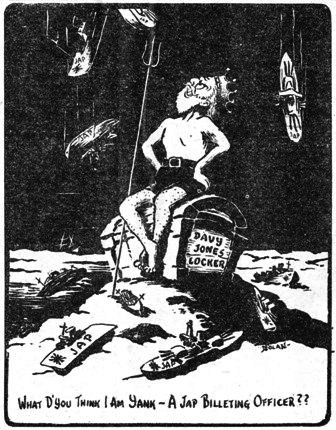
|
I got a new interpreter here and began the journey. After about two hours the horse gave out as the trail was very steep and rough and I walked to the next town. I encountered the same treatment here as before, and was called on for another speech and songs. After three days of similar traveling I reached the town where a truck was waiting to carry me the rest of the way home. Here I took leave of Mr. Lee Shih Nien, the mayor of the town in which I had landed. He had accompanied me all the way. He gave me a card on which the translator wrote the following note for him:
GOOD WISHES
We shall part from here now. I have some wishes to Honorable Mr. Morton Sher:
1. We are very glad to see you in everywhere. 2. We hope that we can drive out our enemy at near future. 3. Beg your pardon, our whole city are ready for a little thing to treat you. 4. We hope Mr. Morton Sher have a good health. 5. We are anxious to receive your letters and so on - The end of wishes.
I had quite a time trying to figure this out and finally had to give up. I had learned much from these people and was reluctant to leave them behind, but I had been out of action for quite a while and was anxious to get back . . . Someday however I hope to return and visit all my good friends that live so far away from the world we live in.
Instructions For Air Raids
By Rf. JOHN SYBO
(Here's what to do in an Air Raid-Ed.)
1. As soon as the bombs start dropping run like hell - it doesn't matter where, as long as you run like hell. (a) Wear track shoes if possible - If people in front of you are slow, you won't have trouble getting over them.
2. Take advantage of opportunities afforded you when Air Raid Sirens sound the alarm signal. (a) If in a bakery, grab a pie or cake. (b) If in a tavern, grab a bottle. (c) If in a movie, grab a blonde.
3. If you find an unexploded bomb, always pick it up and shake like hell - maybe the firing pin is stuck - if that doesn't work, throw it in the furnace or a nice bonfire - the fire department will come later to take care of things - and straighten up matters.
4. If an incendiary bomb is found burning in a building, throw gasoline on it - You can't put it out now so you just might as well have some fun as none. (a) If no gasoline is available, throw a bucket of water on it and lie down - you're dead! (See postscript for details).
5. Always get excited and yell bloody murder - this will add to the fun and confusion and scare the hell out of the kids.
6. Drink heavily, eat onions, limburger cheese, and garlic before entering a crowded Air Raid shelter - it will make you unpopular with the crowd in your immediate vicinity, eliminating unnecessary discomfort that is prevalent if people crowd too closely.
7. If you should be the victim of a direct bomb hit, don't go to pieces - lie still and you won't be noticed.
8. Knock the Air Raid Warden down if they start to tell you what to do - they will always save the best seats for themselves and their friends anyway.
P.S. - The properties of a bomb free the hydrogen from the water causing rapid combustion. In fact it will explode with a helluva crash.
|
To date we have used only photographic contributions of news value in the Roundup. Starting next week, however, we invite contributions of any and all types of photographs in a weekly amateur photo contest. A committee has been formed consisting of Lt. I. F. Haxel, photo officer for the 10th Air Force, S/Sgt. William F. Cox, Roundup photographer and the Roundup editor, to judge contributions submitted. Send in glossy enlargements or negatives including self-addressed return envelope and the Roundup will print, with credit, the best picture of each week. |
The Headquarters China Air Task Force has made their great move, and you should hear the gripes. Those more often heard are:
"Boy! Boy! Where in hell is that boy?"
"Wish we were back up above again."
"The service down here is rotten, and not even any Chungking D." You can listen around the hostel any day and the merits of the two places are praised and cursed respectively.
I wonder why the vagabond lady is always having trouble with her tires? Sgt. Beard says because they do so much flying, but that doesn't make sense to us.
We are losing some of the boys from the task force. They are headed for home after fourteen months of combat duty. These boys were inducted from the A.V.G. last July and after weary months are now going back to their homes with plenty of hamburgers and good American beer waiting for them. Good luck and happy landings to Lts. Bonham, Richardson and Roberts.
|
PRESENT ROUNDUP
Next week troops stationed in New Delhi will be in the grip of the muse as they tread the boards of the Regal theater in a musical comedy entitled "Roundup."
Tickets are on sale at various hotels, the Regal box office, and at your barracks. Cost to soldiers will be Rs. 1-8. Officers and civilians will get bitten for Rs. 4. Curtain time is 9:30 p.m. Dec. 9 and 10.
The show, which is said to be a cross between old fashioned American vaudeville, musical comedy, with a dash of "Helza-poppin'" thrown in, has been largely conducted by Miss Lois Nickerson of the Red Cross, Sgt. Jack Wright, and Corp. Arny Schwartz.
The cast will be composed of American soldiers and women working in our New Delhi headquarters. Featured on the program will be Tenor Norman Epstein, and Sgt. Bruno Nicknadarvich, a baritone, as well as Corp. Roy Groves, doing a tap dance routine.
Corp. Epstein has written an original song, "Crying My Eyes Out For You," that will be introduced. The office gals will do a couple of chorus routines, and you all know what that'll be like.
There'll be a veil dance, with all seven veils; you'll see an out of this world strip-tease, according to Wright, and you'd better come early because all hell is liable to break loose before curtain time.
Music will come from an American soldier orchestra that has been in rehearsal for weeks for this chance to demonstrate those old "eight to the bar" routines.
Proceeds will go into an entertainment fund.
BOMBERS HIT BURMA RAILWAY
The 10th Air Force attacked Mandalay twice last week, once with what Brig. Gen. Clayton Bissell called "the largest formation of 10th Air Force heavy bombers ever to operate from an air base in India."
The complete text of the two communiqu s follows:
"The Japanese-held railroad center at Mandalay, Friday, was the target for air attack by the largest formation of 10th Air Force heavy bombers ever to operate from an air base in India. Engine and other repair shops in the area contain facilities for the maintenance of all railroad equipment in Burma. Many tons of bombs were delivered on the repair shops, the switching yards, and large warehouses to the east. Large fires were observed over the target area as the bombers completed their mission. No enemy fighters were observed. Anti-aircraft fire was weak and ineffective. All of our planes and personnel returned safely."
Second communiqu :
"Heavy bombers of the Tenth Air Force struck again at the Burmese railroad repair center at Mandalay on November 22. In a daylight attack in some force, targets which escaped destruction in the raid of November 20 were damaged or demolished. Crews reported activity in the railroad yards much reduced as a consequence of the previous raid. A direct hit was observed on a large railroad repair shop. Several tons of bombs were seen bursting among the rail sidings and freight cars thereon. No enemy aircraft attempted interception. Anti-aircraft fire was light and inaccurate. All of our planes and personnel returned uninjured to their base.
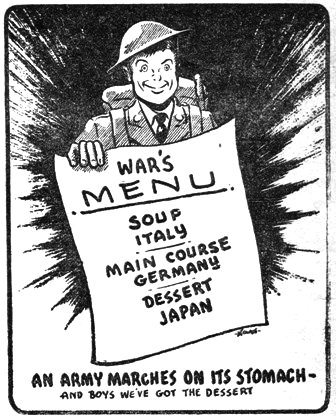
|
The China Fighter Command has established a record of which it may well be proud. Although the unit was activated in the field and was largely composed of new pilots with no previous combat experience, they have been taking an exacting toll of the ratzis airmen.
Only five pilots have been lost in aerial combat while the score sheet indicates that 64 enemy aircraft have been confirmed as destroyed. In addition to those destroyed the combat reports of the pilots show that another 25 may be counted as probables and those damaged are estimated to be over fifty. Now that nearly all pilots have had a taste of combat and are familiar with the tactics of the enemy, it is hoped that from this point on the ratio will be even worse for the yellow fliers.
Five other pilots have lost their lives through other errors and since they were here for the purpose of exterminating the enemy, they must be counted in the ratio even though they were not shot down in actual combat. Even this leaves the edge well in favor of the fighter pilots and even though they are outnumbered on almost every occasion, pilots can encounter the enemy with a feeling of confidence.
Since the last information was published with reference to scores of pilots of the Fighter Command the following pilots have added to their batting averages as indicated: Colonel Scott, Lt. Marks, Lt. Lombard and Lt. Zavitz - two each; Major Hill, Capt. Hampshire, Capt. Slocomb, Lt. DuBois, Lt. Krippner, Lt. Miller, Lt. Sher, Lt. Mooney, Capt. Waite, Lt. Smith, R.E. Lt. Barnes, Lt. Byranton, Lt. Kimball and Lt. Couch - one each.
The C.B.I. Roundup is a weekly newspaper published by and for the men of the United States Army Forces in China, Burma, and India, from news and pictures supplied by staff members, soldier correspondents, Office of War Information and other sources. The Roundup is published Thursday of each week and is printed by The Statesman in New Delhi, India. Editorial matter should be sent directly to Capt. Fred Eldridge, Branch Office Hq., U.S.A.F. C.B.I., New Delhi, and should arrive not later than Monday in order to make that week's issue. Pictures must arrive by Sunday and must be negatives or enlargements. Stories should contain full name and organization of sender.

DECEMBER 3, 1942
Adapted from the original issue of CBI Roundup
Copyright © 2009 Carl Warren Weidenburner
TOP OF PAGE PRINT THIS PAGE ABOUT THIS PAGE SEND COMMENTS
PREVIOUS ISSUE CLOSE THIS WINDOW NEXT ISSUE
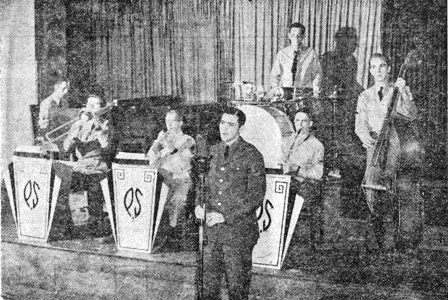 ROUNDUP REHEARSAL - New Delhi soldiers are all set to wow the local populace with a musical comedy called
"Roundup" next week in the Regal theater. The boys will be out on the boards both Wednesday and Thursday nights
starting at 9:30 p.m. Norman Epstein, featured vocalist, is shown warming up his tonsils with the band in
preparation.
ROUNDUP REHEARSAL - New Delhi soldiers are all set to wow the local populace with a musical comedy called
"Roundup" next week in the Regal theater. The boys will be out on the boards both Wednesday and Thursday nights
starting at 9:30 p.m. Norman Epstein, featured vocalist, is shown warming up his tonsils with the band in
preparation.